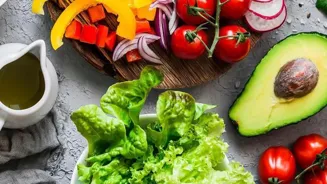Unveiling Fiber Power: Elevate Your Health with 6 Essential Facts! Dive into the world of fiber's impact on your well-being
Namaste, readers! Are you feeling sluggish, like your tummy is staging a dharna?
Maybe your energy levels are doing the limbo. Well, the answer might just be hiding in plain sight, right in your kitchen: Fiber!
This unsung hero of the digestive system is more than just roughage; it’s a nutritional powerhouse that can transform your health, one roti, one dal, one sabzi at a time. Let's dive into six simple facts about fiber that will make you say, "Wah! I need more fiber in my life!"
Fiber sweeps through your system for gut health and overall well-being
Think of fiber as the sweeper for your insides. It's the part of plant-based foods that your body can't digest. It passes through your system, cleaning up shop as it goes. This helps prevent constipation and keeps things, shall we say, moving along smoothly.
A healthy gut is a happy gut, and a happy gut means a happy you! Fiber comes in two types: soluble and insoluble. Soluble fiber dissolves in water, forming a gel-like substance that can help lower cholesterol and regulate blood sugar levels. Insoluble fiber doesn't dissolve in water.
Instead, it adds bulk to your stool, which helps prevent constipation. Getting enough fiber ensures better digestion, reduced bloating, and a feeling of overall well-being. So, load up on fiber-rich foods like fruits and vegetables because your gut will surely thank you.
This not only keeps your digestive system ticking but also aids in preventing more serious issues down the road. It's like giving your body a regular internal car wash, keeping everything running in top shape.
Fiber is not just a supplement; it's a natural and essential part of a healthy diet that contributes significantly to your overall wellness.
Fiber-rich foods aid weight loss by promoting fullness and reducing overeating
Trying to shed a few kilos? Fiber can be a real game-changer. Fiber-rich foods are naturally filling, meaning they keep you feeling full for longer. This helps prevent overeating and those sneaky snack attacks between meals.
When you eat a plateful of, say, mixed vegetables, the fiber content signals to your brain that you're satisfied. This reduces the urge to grab that samosa or sugary treat an hour later. By incorporating more fiber into your diet, you’re essentially creating a natural appetite control system.
This reduces your caloric intake, thus supporting healthy weight management. Also, fiber often comes packaged with other essential nutrients, ensuring that you're nourishing your body while keeping your weight in check.
A balanced diet with adequate fiber can become your best friend in your journey to a healthier, happier you, without feeling deprived. It is a sustainable and enjoyable way to manage your weight effectively.
Fiber stabilizes blood sugar levels and boosts metabolism
For those concerned about blood sugar levels, fiber is truly a superhero. Soluble fiber, the kind you find in oats and beans, slows down the absorption of sugar into your bloodstream. This prevents those dramatic spikes and crashes that leave you feeling tired and cranky.
Consuming fiber-rich foods helps maintain a steady stream of energy. This is especially important if sugar levels are a concern. By preventing those sudden surges, fiber helps avoid long-term complications associated with unstable blood sugar.
Fiber also improves insulin sensitivity, making it easier for your cells to use the glucose in your blood for energy. This ensures that your body effectively utilizes sugar, preventing it from building up in your bloodstream.
A consistent fiber intake becomes a fantastic way to promote a healthy and balanced lifestyle, contributing significantly to your metabolism.
Soluble fiber lowers LDL cholesterol for a healthy heart
Forget expensive supplements; fiber is your heart's best friend. Specifically, soluble fiber helps lower LDL cholesterol, the "bad" kind that clogs arteries. By reducing LDL cholesterol levels, fiber helps prevent plaque buildup in your arteries, also reducing the risk of heart disease.
A diet rich in fiber promotes overall cardiovascular health, ensuring a healthy and strong heart. Fiber also binds to cholesterol in the digestive system, preventing it from being absorbed into your bloodstream.
Furthermore, fiber-rich foods are often packed with other heart-healthy nutrients, such as potassium and antioxidants. This holistic approach to heart health ensures that you're not just lowering cholesterol, but also nourishing your body with a wide range of beneficial compounds.
So, load up on those fruits and vegetables and you and your heart will be thanking you.
High-fiber diet reduces cancer risk and promotes overall health
While more research is ongoing, studies suggest that a high-fiber diet may reduce the risk of certain types of cancer, particularly colon cancer. Fiber promotes healthy digestion and reduces the amount of time that waste products stay in the colon, thus minimizing exposure to harmful substances.
Fiber also supports the growth of beneficial bacteria in the gut, which can produce compounds that have anti-cancer properties. Moreover, many fiber-rich foods are packed with antioxidants and other compounds that protect cells from damage.
While fiber is not a guaranteed cure for cancer, incorporating it into your diet is a wise step toward promoting overall health and well-being. It ensures you're utilizing food as a preventive measure, boosting your body's natural defenses.
So, don't underestimate the power of this humble nutrient in your fight against diseases, including cancer.
Simple swaps can boost fiber intake significantly in daily diet
Making sure you get enough fiber doesn't require drastic changes. Simple swaps like choosing whole-wheat bread over white bread, adding beans to your curries, and snacking on fruits and vegetables can make a big difference. Instead of reaching for a packet of biscuits, grab apple slices.

Always opt for brown rice. These small changes can quickly add up to a significant increase in your daily fiber intake. Reading food labels is crucial. Check the fiber content per serving and aim for foods with at least 3-5 grams of fiber per serving.
Make fiber a star in your diet by eating at least one fruit or vegetable with every meal. By prioritizing whole, plant-based foods, it's easy to get your daily dose of fiber and start enjoying all the health benefits it has to offer.
AI Generated Content. Glance/InMobi shall have no liability for the content




















